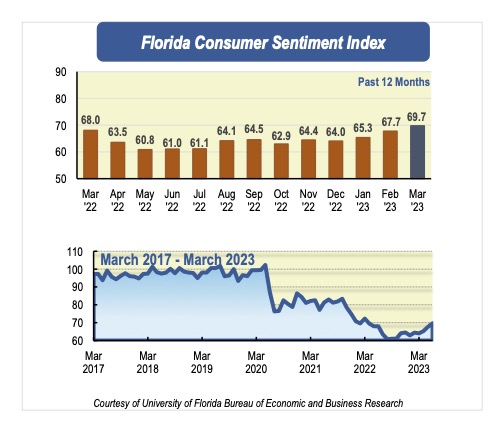Despite bank failures and increased interest rates Floridian sentiment moves higher

Florida Consumer Sentiment Index
Consumer sentiment in Florida increased for a third month in a row in March to 69.7, up 2 points from a revised figure of 67.7 in February. On the contrary, national consumer sentiment plummeted 5 points.
“Considering the chaos in the banking sector in mid-March, which saw the largest bank failure since the 2008 financial crisis, the positive change in consumer attitudes among Floridians in March comes as a surprise. Moreover, despite some speculation that the Federal Reserve would halt rate hikes in response to the recent string of bank failures, the Fed officials decided to continue raising interest rates in their latest meeting as inflation remains high and the labor market is still tight,” said Hector H. Sandoval, director of the Economic Analysis Program at UF’s Bureau of Economic and Business Research.
Among the five components that make up the index, four increased and one decreased.
Floridians’ opinions about current economic conditions were mixed. Views of personal financial situations now compared with a year ago increased 2.1 points from 58.6 to 60.7. Notably, these views were shared by Floridians across all sociodemographic groups. In contrast, opinions as to whether now is a good time to purchase a major household item like an appliance fell slightly by three-tenths of a point from 57.9 to 57.6. However, these views were divided across sociodemographic groups with women, people younger than 60, and people with an annual income above $50,000 expressing more-favorable views.
Future economic expectations portrayed an improved outlook in March. Expectations of personal finances a year from now went up 2.3 points from 81.5 to 83.8. Expectations about U.S. economic conditions over the next year rose 2.1 points from 67.6 to 69.7 while the outlook of U.S. economic conditions over the next five years showed the greatest increase in this month’s reading, up 3.7 points from 73 to 76.7. These positive views were shared by all Floridians except for people with an annual income under $50,000, whose reading showed a negative change across the first two components and people 60 and older who also reported less-favorable views regarding national economic conditions over the next year.
Job gains remained solid in February. The unemployment rate in Florida held steady at 2.6%, while the national increased slightly to 3.6%. First-time unemployment claims in Florida continued to decline, reaching their lowest level since December. Over the year, the state gained 427,400 non-agricultural jobs, with all ten major industries experiencing positive gains. Notably, the leisure and hospitality industry saw the largest increase in employment.
“The latest data clearly indicates that the labor market remains unusually tight. When combined with the persistently high inflation rate, it strongly suggests that the Federal Reserve will continue to raise interest rates in the coming months,” said Sandoval.
"Over the past 12 months, the Fed has increased interest rates more than at any time since the early 1980s. Moreover, the recent turmoil in the banking sector might have dented economic growth and increased the risk of a recession as financial institutions are likely to become more cautious in their lending. As a result, we anticipate that consumer sentiment in Florida will remain at its low levels for some time to come," Sandoval added.
Conducted February 1st through March 30th, the UF study reflects the responses of 211 individuals who were reached on cellphones and 313 individuals reached through an online panel, a total of 524 individuals, representing a demographic cross section of Florida. The index used by UF researchers is benchmarked to 1966, which means a value of 100 represents the same level of confidence for that year. The lowest index possible is a 2, the highest is 150.
Details of this month’s survey can be found at https://www.bebr.ufl.edu/florida-consumer-sentiment/.
